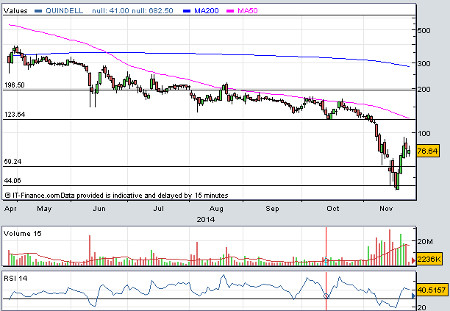Quindell man gives up on share deal
26th November 2014 11:07
by Lee Wild from interactive investor
Share on
may be many things, but boring is not one of them. It's certainly careless, having lost a broker, a PR firm and its founder and chairman within days of each other. The share price had plunged 94% in seven months, too. Now, finance chief Laurence Moorse, one of three bosses caught up in the shares-for-loans scandal, has given up his rights under the controversial scheme.
In a brief statement Wednesday, Moorse said he's received a notice of margin call under the agreement with Equities First Holdings (EFH). Under the terms of the deal, which became public knowledge on 10 November 2014, the three would either have to hand over more shares, or a pile of cash if the shares fell 20%.
At the time the agreement was billed as a director share purchase, but in reality involved Moorse, chairman Rob Terry and non-exec Steve Scott selling over 10 million shares to EFH in return for money.
Mr Moorse did not meet this margin call which, consequently, has led to the termination of the Agreement. As a result, his right to repurchase 200,000 ordinary shares of 15 pence each transferred by him to EFH under the Agreement will be terminated with effect as of today.
Moorse now owns 1.05 million shares.
Last week, Terry said he would relinquish his rights to buy 8.85 million shares under the EFH sale and repurchase agreement, rather than satisfy the margin call "as this would now no longer make economic sense".

The share deal was the straw that broke the camel's back, and effectively forced Moorse out after next year's AGM. Top man Rob Terry and non-exec Steve Scott are off straight away.
Ironically, Quindell shares have rallied in recent days, up from a three-year low of 40.66p to as high as 93p on Monday, briefly. Now at 75p, and with rumours of asset sales still doing the rounds, the shares remain incredibly volatile, and will likely remain so.
Yes, the company makes money, and earnings are growing, but the City has a real problem with Quindell's business model, which recognises the revenue in its accounts way before it receives payment for the job. That still means it might end up needing more cash to tide it over until that money comes in.
A fresh face cannot change that. And with all the negative publicity and corporate stigma, will Quindell be able to attract the right people for the three jobs up for grabs? It also remains to be seen whether the company will be able to win new contracts and retain existing ones given the controversy it generates. Hold on to your hats.